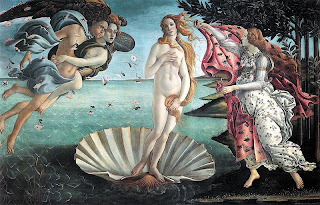Signora da Vinci: A Novel
By: Robin Maxwell
I finished Signora da Vinci just twenty-four hours ago and while my heart says give it a 9 out of 10 stars, my brain says 6. Why the conflict? Because my heart is that of a middle-aged woman who is unashamed of her obsession with daytime television, romance, and epic tragedy. My brain belongs to a 23-year-old waitress who has her Master's degree and simply cannot overlook easy word choices and poor writing. See my dilemma? (Aside: Anyone else think that dilemma would best be spelled 'dilemna'?)
Since Signora da Vinci has not won any book awards and most certainly has not gained the notoriety of A Heartbreaking Work of Staggering Genius, I feel a brief synopsis is necessary. Here goes...
Signora da Vinci is a historical fiction narrative about Leonardo da Vinci's mother, Caterina, and her purported life story. Caterina, being raised by an apothecary/alchemist, is educated beginning at the age of 8 in subjects ranging from religion, philosophy, literature, physics, art, etc. Although a wise young adult, she inevitably falls in love with a wealthy Vinci inhabitant Piero and, after promised his love and matrimony, has sexual relations outside of marriage (SCANDAL!!!) Well, like all good love stories, his family disapproves and, since he is spineless, he moves to Florence and leaves Caterina to raise her forthcoming child on her own. Leonardo is born and OF COURSE Piero's family now wants the child because it's the 1st born son of their family, however illegitimate. As the story unfolds, Caterina's dedication to her son is developed and it lays the groundwork for her motivation throughout her (fictionarlized) life. After discovering Leonardo's artistic talents, Caterina is the one that sets the ball in motion for him to apprentice under Verrocchio in Florence. However, her longing to be near her son is too great and so she decides that, with her education to support her, she could easily disguise herself as a man and work as an apothecary in Florence. After this relocation, Caterina's (now Cato the Apothecary) life truly begins as she is surrounded by music, art and science and befriends the greatest minds of her time, including Lorenzo de' Medici (who also becomes her lover...GREATER SCANDAL). The book describes some of the greatest artworks and artists of the times, but also delves into the political and religious turmoil surrounded Italy in the 15th century. The book concludes with Caterina venturing to India after Leonardo is safely and successfully creating works in Milan.
Phew. That was tough! (Book summarizer I am not.)
So what did I love about this book?
- The Historical References! As a person who obtained her Bachelor's degree in History and her Master's in Art History, this book was right up my academic alley. Reading a novel that name-dropped Medici, Verrocchio, Botticelli, etc. while discussing the historical/religious/political context of 15th century Italy was just amazing. Maxwell's incorporation of some of the most iconic artworks of all time into the narrative was thrilling as well. I mean, what if Botticelli really did reveal the work below as she describes...what if...
Botticelli, Birth of Venus
- Maxwell's ability to tell such a convincing and interesting story that I was able to suspend my disbelief. I didn't spend the book saying to myself "God, that's impossible!" or "How far-fetched!" I spent my time reading this novel saying "Did that really happen?" What is great about that response is that it fosters my desire to research more and, little known fact, I LOVE learning. So thanks Maxwell for that.
- This book may have been about Leonardo da Vinci, the time period, Italy, Leonardo's mother and many other things, but I think Maxwell's greatest ambition in Signora da Vinci was to discuss the importance of learning, of knowledge, especially among women. I didn't really focus on this particular plot line until the very end. Maxwell cleverly used her epilogue to get to the heart of the matter: that if you are knowledgeable, or you strive to obtain knowledge, regardless of your gender, that you will never be fully without hope or faith. Beautiful, really.
What did I not like about this book?
- You can only suspend disbelief for so long.
- The story was obviously catered toward women, or the highly sympathetic/affectionate types.
- The writing. Just because the story takes place in the 15th century, it does not mean that every 20 sentences or so you suddenly adjust your language and sentence structure. I guess if it was consistent it would have worked, but it wasn't. It broke the narrative on occasion--reminding the reader that this was a modern-day telling of a possibly entirely fictional life.
So, that's my story and I'm sticking to it.
I read this book fairly quickly so I would highly recommend it to anyone who wants an enjoyable, pleasing read without necessarily wanting to learn any historical information definitively.
Next book, The Passage, to be read in tandem with Ms.DuneManic (AKA- Darth Rachel). Prepare yourselves for not just one, but TWO, point of views!




No comments:
Post a Comment